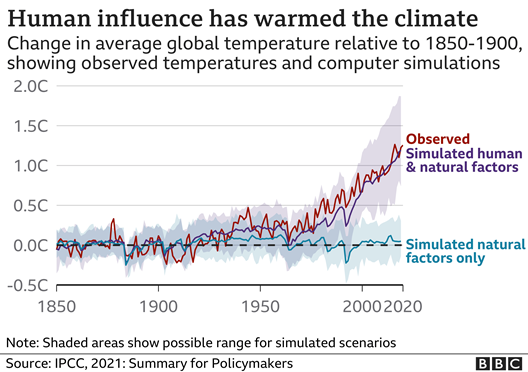Earlier this month, the Intergovernmental Panel on Climate Change (IPCC), published their landmark Sixth Assessment Report. We know that climate science can be daunting which is why we’ve got everything you need to know right here in our IPCC Report Summary.
As the news fills with images of severe weather across the globe, the creeping reality of the climate crisis is more apparent than ever. As a body of the UN, the IPCC report is the most important reflection on the current state of our climate. There has not been a major review of climate change science since 2013, making this report the first of its kind in 8 years with two further reports to come out over the next year.
We’ve summarised the importance of the IPCC Report report, the key takeaways and suggest where we can go from here.
Why now?
The report was published less than 3 months before the key climate summit in Glasgow, COP26. COP26 could be the world’s greatest ‘last chance’ to get climate change under control as world leaders will undertake 12 days of talks to update their plans for reducing emissions.
The 2015 Paris Climate Agreement was a pact that bound nearly every nation in the world to keep global temperatures well below 2 degrees this century and to try to keep temperatures below 1.5 degrees of warming. The outcomes of the IPCC’s report add a specific urgency for these talks to be decisive in laying out plans to limit global warming to 1.5 degrees.
The IPCC Report Summary: Key Takeaways
- The global climate is changing faster than we previously thought: since 1970, global surface temperatures have risen faster than in any other 50-year period over the past 2,000 years. This warming is “already affecting many weather and climate extremes in every region across the globe”
- The global surface temperature of Earth is increasing: global surface temperature was 1.09 degrees higher in the decade between 2011-2020 than between 1850-1900
- Extreme weather events are “virtually certain” to be more frequent and more intense since the 1950s
- Every degree counts: all of these changes have occurred at 1.1 degree Celsius of warming above 1850-1900 levels, below the 1.5 degree goal of the 2015 Paris Agreement
- Regardless of the emissions scenarios, temperatures will reach 1.5 degrees above 1850-1900 levels by 2040
- To halt (and potentially reverse the rise in temperatures) we need to cut global emissions in half by 2030 and reach net zero by 2050

What does this mean?
The IPCC Report reminds us that we need to reduce greenhouse gasses, and reach a global net zero, by 2030 or the effects of global temperature increase will be irreversible. The weight of these effects will be felt by extreme weather events and the decline of our planetary support systems (oceans will become more acidic, biodiversity will decrease and glaciers will melt).
Reaching net zero involves harnessing clean technology to reduce greenhouse gas emissions as much as possible. Carbon capture and storage would then be utilised to bury any remaining emissions or absorb them by planting trees.
What next?
A huge part of tackling the climate crisis is staying informed and engaged (like reading this IPPC Report Summary blog!). Share this information with your family and friends to ensure that people are aware of the extent of the crisis.
The facts are shocking, but we have a window in which to act and create a world that is healthier, fairer and zero carbon. This action demands many people coming together to support drastic shifts in our economy and infrastructure.
Whatever action you take, big or small, can add up to make a big difference. Could you engage the people in your organisation, university, NHS Trust or local authority to take action using our sustainability engagement tools? Get in touch to find out more!








